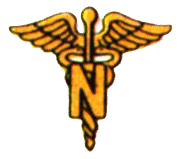
This list was compiled by another blogger named Ryan Winter from
http://blog.soliant.com/travel-nursing. I found it really interesting, so hopefully he doesn't mind me borrowing it. Here it is:
1. A Caring Nature:If a person cannot care about the people they are serving, they will not excel as a nurse. Nurses deal with the sick and injured and their families on a daily basis, and they need to be able to show them that they truly care about their situation. (I definitely think this is true. And Jean Watson would definitely agree, haha).
2. Be Empathetic: Nurses regularly deal with people who are scared and in pain. They must be able to put themselves in their patients’ shoes if they are going to give them the quality of care that a good nurse provides. (I agree with this one as well. It is important to connect with all your patients, although this can be emotionally taxing if taken too far).
3. Be Detail-Oriented: Nurses must remember to write everything they do on patients’ charts. They must also remember to bring medications at the correct times. Being an organized detail-oriented person is therefore crucial for someone in this career field. (I need to work on this one. Nurses need to balance a million different things, all at once. I think I'll need years of experience before I am really organized).
4. Be Emotionally Stable: Nurses feel the joy of seeing a new baby born, followed by the pain of losing a long-term patient who had become a friend. Emotional stability is crucial in order to survive the roller coaster ride of emotions nurses must endure on a daily basis. (This one I need to work on too. Nurses definitely need to leave their work at the floor, and not bring the emotional aspects of the work home with them. They also need to be in charge of their emotions to care effectively).
5. Be Adaptable: No day is quite like the next when you work as a nurse, so they need to be able to adapt to circumstances. People are unpredictable at the best of times, but under stress become even more unpredictable, so a nurse’s typical workday will require flexibility and adaptability. (And I definitely need to work on my ability to be adaptable too. I like routine. And I despise change).
6. Have Physical Endurance:Breaks for nurses are few and far between. They are on their feet all day, sometimes for 12 or more hours at a time, so nurses must have good physical endurance to succeed in nursing. (I can handle this. I like to be active. And of course, having a really good pair of Nursemates always helps).
7. Be a Quick Thinker: When a nurse notices something is not right with a patient, they need to be able to make decisions quickly and put their plans into action instantly. Nursing is not the career for someone who needs time to think about a situation before responding, because even a fraction of a second can mean the difference between life and death. (Ah, critical thinking. I believe nurses only truly become skilled at this with lots of experience).
8. Have Great Judgement:A nurse must be able to look at a patient’s current state and accurately assess what is or is not needed. This must happen quickly during emergencies. Nurses therefore need sound judgment and maturity. (Again, I think this is a learned skill, that really only comes with experience as well. Really good judgement comes from years of studiyng and years of clinical experience).
9. Be Hard-Working:Nursing is a never ending job. Someone is always ill and in need of some sort of aid or attention. Its also unusual for a hospital or medical centre to be overstaffed, which of course means more workload on each nurse in the unit. Being a hard worker is therefore a very important trait. (I think I am okay with this one. If nurses are really lazy, someone's health could be seriously compromised).
10. Have Great Communication Skills:Nurses communicate with each other, doctors, patients, and patients’ families on a daily basis, so being able to communicate clearly and effectively, and to read people is necessary for people in this career. (I think I need to work on this one as well).
I don't think everybody is perfect or possesses all of these traits. I really think most of them comes with lots of experience on the floor. But the best part of nursing is that it is a continual learning process, and I think every nurse grows throughout their career in their skills and in their abilities. No one is perfect once they graduate.





